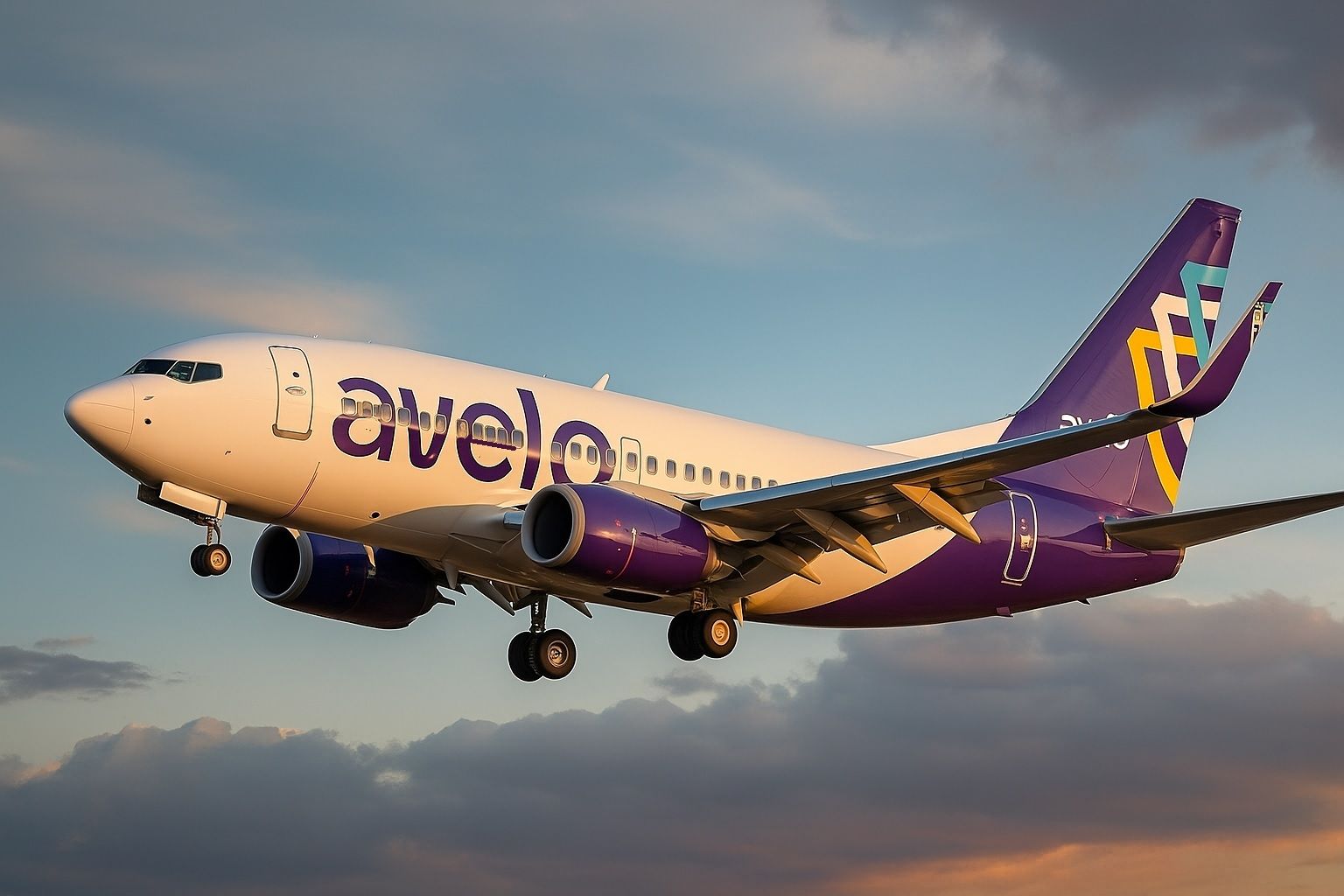Ultra‑low fares from Michigan to Florida and new routes from a growing Charlotte‑area airport signal a big bet on secondary hubs — even as regulators, activists and rivals raise questions about how sustainable the model really is.
CHARLOTTE, N.C. / DETROIT — November 16, 2025.
Avelo Airlines is doubling down on its East Coast strategy with eye‑catching fares and new nonstop routes that could change how many Americans plan spring trips in 2026 — especially in the Charlotte and Detroit metro areas.
In the last week, the Texas‑based ultra‑low‑cost carrier has rolled out $34 one‑way fares from Detroit to central Floridaand $35 one‑way fares from Concord‑Padgett Regional Airport near Charlotte to Chicago and Nashville, cementing its presence at smaller, secondary airports that big legacy airlines often overlook. Detroit Free Press+2https://www.wbtv.com+2
At the same time, Avelo is facing intense scrutiny over its business model, a controversial deportation‑flight contract with U.S. immigration authorities, and growing skepticism about whether ultra‑cheap tickets can survive in a turbulent aviation industry. Detroit Free Press+1
Rock‑Bottom Fares From Concord and Detroit
Concord‑Padgett Regional Airport scores $35 flights to Chicago and Nashville
Concord‑Padgett Regional Airport (IATA code: USA), about 30 minutes northeast of Uptown Charlotte, has quietly become one of the region’s hottest spots for cheap flights thanks to Avelo’s rapid build‑up there. Wikipedia+1
This week, local outlet WBTV reported that one‑way fares will start at $35 for new nonstop Avelo flights from Concord to Chicago O’Hare International Airport (ORD) and Nashville International Airport (BNA). Both routes are set to launch February 12, 2026, with flights operating four days a week — Monday, Thursday, Friday and Sunday. https://www.wbtv.com+1
According to the airline, the flights will use Boeing Next‑Generation 737 aircraft and are aimed squarely at spring‑breakers, vacationers and families visiting friends and relatives. A statement from Avelo’s leadership framed the new Concord routes as part of a push to “inspire more travel” as people plan 2026 trips. https://www.wbtv.com+1
An updated Concord airport guide from Axios Charlotte notes that with the addition of Chicago and Nashville, Avelo will serve 10 nonstop destinations from Concord, including New Haven, Long Island, Albany, Rochester, Lakeland/Orlando, San Juan, West Palm Beach and Boston/Manchester. Axios
City officials say Avelo’s decision to base aircraft at Concord‑Padgett — alongside Allegiant’s existing operations — has already created dozens of local jobs and boosted tourism‑linked spending in Cabarrus County. Yahoo+1
Detroit’s $34 flights to Florida target spring‑training fans
In the upper Midwest, the headline number is even lower.
The Detroit Free Press reported Friday that Avelo is offering $34 introductory one‑way fares from Detroit Metro Airport (DTW) to Lakeland Linder International Airport (LAL) in central Florida, timed to coincide with Detroit Tigers spring training. Detroit Free Press
Key details from Avelo’s media announcement and subsequent reporting:
- Route: Detroit Metro (DTW) ↔ Lakeland Linder (LAL), a smaller airport roughly midway between Tampa and Orlando and about a 20‑minute drive from the Tigers’ spring‑training facility in Lakeland. Detroit Free Press
- Start date & frequency: Flights are scheduled to begin February 11, 2026, operating twice weekly on Wednesdays and Saturdays using Boeing 737 aircraft. Detroit Free Press
- Pricing: Promotional $34 one‑way fares significantly undercut previous low‑fare promotions like Frontier’s $49 tickets to Florida from Detroit. Detroit Free Press
Avelo’s CEO Andrew Levy pitched the new service to the Free Press with an exuberant line: “Detroit — say hello to spring training in Lakeland with Avelo,” promising “convenient, affordable and industry‑leading reliability” for Motor City travelers. Detroit Free Press
The Lakeland route is part of a broader wave of announcements that also includes new or returning routes linking Chicago, Concord (NC), Wilmington (DE), Atlanta and Nashville, with limited‑time fares as low as $34–$35 on select flights in March 2026. The Sun+1
Avelo’s East Coast Pivot — and the Rise of Secondary Airports
Avelo’s aggressive expansion in Concord and Detroit is not happening in a vacuum. It’s the latest step in a strategic pivot to the Eastern U.S., especially secondary airports that sit just outside major metro areas.
According to Avelo’s corporate history and recent route announcements:
- The airline has progressively shifted aircraft away from the West Coast, culminating in the closure of its base at Hollywood Burbank Airport and a complete exit from West Coast flying by the end of this year. Wikipedia+1
- It has instead concentrated growth on East Coast bases in Concord/Charlotte, New Haven, Lakeland, Wilmington (DE), Wilmington (NC), Phoenix/Mesa and Raleigh‑Durham, serving a network of 38 destinations with a 22‑strong Boeing 737 fleet. Wikipedia+2Axios+2
- In September, Avelo placed a firm order for 50 Embraer 195‑E2 jets, with options for 50 more, positioning itself to become the first U.S. airline to operate the new‑generation aircraft from 2027 onwards. Wikipedia
At Concord‑Padgett specifically, Axios reports that Avelo’s base promises up to 50 local jobs and two stationed aircraft, though the growth path has already been bumpy. The airline cut six Concord routes in April 2025 citing “poor performance indicators,” only to later extend its schedule through mid‑February 2026 and add new routes, including San Juan and West Palm Beach. WCCB Charlotte+3Axios+3Hoodline+3
This “push‑and‑pull” — aggressively adding routes, then trimming underperformers — is typical for ultra‑low‑cost carriers as they experiment with where demand is strongest.
Can Airlines Really Survive on $34 Tickets?
A key question for both travelers and investors is obvious: How can an airline make money selling $34 or $35 seats?
Industry analysts and Avelo’s own executives point to several factors: Detroit Free Press+1
- Secondary airports mean lower costs.
Airports like Concord‑Padgett and Lakeland Linder typically charge lower gate and facility fees than big hubslike Charlotte Douglas or Orlando International. That helps keep base fares low, even if amenities are more limited. Detroit Free Press+1 - Ancillary fees are where the money is.
Ultra‑low‑cost carriers often rely on revenue from bags, seat assignments, priority boarding, and change fees, while keeping the headline fare as low as possible. Travelers who only bring a small personal item might get close to the advertised price; everyone else pays more. - High‑density seating and creative cabin layouts.
The Free Press notes that designers are testing seating concepts like the “SkyRider” semi‑standing seat, which could allow airlines to cram up to 20% more passengers onto each aircraft if regulators approve it. Detroit Free Press - Seasonal and niche demand.
Avelo is timing Detroit–Lakeland flights around spring training, hoping to fill planes with Tigers fans escaping winter. Similarly, Concord’s Chicago and Nashville flights are scheduled on days that likely match leisure demand patterns. Detroit Free Press+1
Even so, there is real skepticism inside the industry. United Airlines CEO Scott Kirby recently called deep‑discount carriers an “interesting experiment” that is ultimately failing, arguing that a race to nearly free tickets is not sustainable long‑term. Detroit Free Press
The Free Press also highlights how Frontier and Spirit — two of the biggest U.S. budget airlines — are under severe financial pressure, with Spirit going through another bankruptcy filing and planning large furloughs. Detroit Free Press
Avelo told the paper it has “not noticed any major decline in passenger traffic this year” and is seeing more bookings, especially as cost‑conscious travelers look for alternatives amid broader aviation disruptions. Detroit Free Press
Avelo’s Deportation‑Flight Backlash Clouds Its Expansion
Underlying many of the headlines about cheap flights is a more controversial story.
Earlier this year, Avelo signed a long‑term charter agreement to operate deportation flights for U.S. Immigration and Customs Enforcement (ICE), basing part of that operation in Arizona. Wikipedia
The Detroit Free Press reports that the contract has triggered protests, boycotts and political pressure in several communities where Avelo operates or sought incentives, including Connecticut and Oregon. Detroit Free Press
- Connecticut officials reportedly threatened to revoke some tax breaks tied to Avelo’s operations at Tweed New Haven Airport. Detroit Free Press+1
- A coalition of local and national activists has pushed for boycotts and urged cities to stop offering incentives or doing business with the airline. Wikipedia+1
Today in Baltimore, for example, organizers are canvassing at the JFX Farmers Market under the banner “Avelo Out!”, urging Maryland officials not to support or subsidize carriers that participate in deportation flights. Action Network+1
In a statement earlier this year, CEO Andrew Levy acknowledged that the deportation contract is “a sensitive and complicated topic,” but said it provided financial stability that would allow Avelo to keep roughly 1,100 crew members employed and continue expanding scheduled passenger service. Detroit Free Press+1
That tension — between affordable travel for everyday passengers and ethical concerns over how those fares are funded — is likely to remain a key part of the Avelo story as the airline grows.
Travelers Are Nervous About Flying — Even as New Routes Launch
The timing of Avelo’s bargain‑fare announcements also intersects with a broader dip in public confidence in air travel.
Recent months have seen multiple high‑profile aviation incidents, including a deadly UPS cargo plane crash in Louisville that left a half‑mile trail of destruction and killed 14 people on board and on the ground. Detroit Free Press
A poll conducted earlier this year by the Associated Press‑NORC Center found that:
- The share of Americans who consider air travel “very or somewhat safe” has fallen from 71% in 2024 to 64%.
- Those who view it as “very or somewhat unsafe” rose from 12% to 20%, following fatal crashes in Washington, D.C., Nome, Alaska and Philadelphia. Detroit Free Press
Avelo, for its part, has emphasized “reliable air service” in its recent Detroit and Concord announcements, arguing that its focus on less congested secondary airports helps avoid the worst of systemic delays seen at mega‑hubs. Detroit Free Press+1
On November 16, Regulators Also Turn Up the Heat on Airline Marketing
While U.S. flyers are fixated on fares, European regulators are sharpening their focus on airline honesty.
Today, travel site Live and Let’s Fly detailed a coordinated European Union crackdown on “greenwashing” by airlines, following an investigation triggered by complaints that carriers were overstating the climate benefits of carbon offsets and sustainable aviation fuels. Live and Let’s Fly
Under the new EU guidance:
- Airlines cannot imply that buying an offset or using a small amount of alternative fuel makes a single flight “carbon neutral.”
- Any claims about climate goals or sustainable aviation fuel must be supported with clear data, timelines and transparent calculations. Live and Let’s Fly
Although the rules are aimed at European carriers, the move adds to global pressure on airlines — including low‑cost carriers like Avelo — to align their marketing with measurable environmental action, not just catchy slogans.
With U.N. climate talks and public scrutiny intensifying, airlines that trumpet low fares and expansion plans may increasingly be asked how those growth strategies square with climate commitments.
What Travelers Should Know Before Booking Avelo’s Ultra‑Cheap Flights
For consumers, the sudden burst of $34–$35 flights can feel like a travel jackpot. But before you jump on the deals from Detroit or Concord, it’s worth keeping a few points in mind:
- Expect extra fees.
The rock‑bottom prices generally don’t include checked or overhead‑bin bags, seat selection or priority boarding. Once you add those, the final cost may look more like — or even more than — a traditional airline’s basic economy fare. - Check the calendar carefully.
Introductory fares are often limited to specific travel windows, such as the spring‑training period for Detroit–Lakeland or early‑spring weeks for Concord–Chicago/Nashville. Outside those dates, prices can rise sharply. Detroit Free Press+2Axios+2 - Know your airport.
- Concord‑Padgett is a smaller airport with one security checkpoint, two gates and a compact terminal; it’s less intimidating than Charlotte Douglas, but ground transportation options are more limited. Axios+1
- Lakeland Linder sits between Tampa and Orlando; if you’re aiming for Disney or Gulf Coast beaches, factor in the extra drive time — and potentially car‑rental demand. Detroit Free Press
- Understand route volatility.
Avelo has already added and dropped routes from Concord within a single year when “poor performance indicators” showed weak demand. If you book far in advance, keep an eye on your email and be prepared for the possibility of schedule changes or cancellations. Axios+1 - Consider the ethics.
Some travelers are choosing to avoid Avelo because of its ICE deportation contract, while others see the low fares as a separate issue. Whatever your stance, it’s worth knowing how your ticket fits into the airline’s broader business model. Detroit Free Press+1 - Watch the wider industry signals.
With CEOs of larger airlines warning about the sustainability of ultra‑low prices and regulators cracking down on marketing claims, the budget‑airline landscape could change quickly in 2026–2027. Detroit Free Press+1
The Bottom Line
On this mid‑November Sunday, the story of Avelo Airlines is being written in two very different fonts: bold headlines about $34–$35 flights from Detroit and Concord, and fine print about deportation flights, financial risks and environmental scrutiny.
For travelers in Michigan and the Carolinas, the new routes mean real savings and new nonstop options that didn’t exist a few years ago. Whether Avelo — and the broader ultra‑low‑cost model — can keep those prices flying without turbulence is a question that will loom large well beyond the 2026 spring‑break season.









